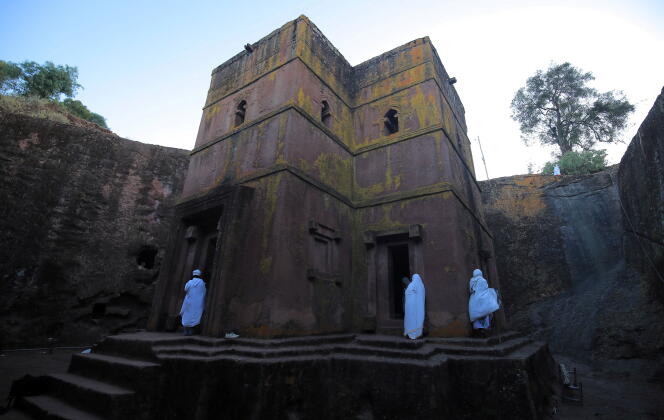
The rooms of the Panoramic Hotel remain desperately empty. At the reception, the 10 or so employees are playing cards, plunged into darkness because of a power failure that is dragging on. "In four months, a little less than 50 people have stayed with us, and even then, I’m one of the lucky ones," said Tesfaye Getinet, the manager of this establishment in Lalibela, a small town in Ethiopia famous for its rock-hewn churches from the 13th century. In the past, its hotel welcomed almost 20 guests a day.
In the past, that is, before the Covid-19 pandemic and the outbreak of civil war, which together brought tourism to a sudden halt in this town in the Amhara region in the north of the country. In conflict with the government of Abiy Ahmed, rebels of the Tigray People’s Liberation Front (TPLF) controlled the area from August to December 2021.
The occupation ruined the hopes of recovery for this city nicknamed the "Jerusalem of Africa" or the eighth wonder of the world. In times of peace, it attracted several tens of thousands of visitors per year.
In this holy city of Ethiopian orthodoxy, "at least 80% of the population depends on income from tourism," said Mr. Getinet. Today, the inhabitants live on little means. Along the small cobblestone street that leads to the Panoramic Hotel, Adugnaye tidied up her souvenir store and swept away the cobwebs. "You’re lucky," she said. "This is the first time I’ve opened in two years!"
'About one foreign tourist per day'
Next to her shop, the gates of the other lodgings are all closed. Not far away, the facade of the Cliff Edge luxury hotel bears the scars of a drone strike by the Ethiopian army targeting Tigray officers. Some establishments were also ransacked by TPLF fighters.
The city’s 200 guides used to hunt down tourists around the cobblestone square that leads to the rock churches. Today, there are only two of them on the square, killing time. "There’s not much to say, it’s depressing," said Josef Abate, a historical guide. "Many are depressed. We used to work four or five days a week. In two years, I’ve had only one client." His inactivity has even put him in trouble with his parents, whom he can no longer help financially, he said.
Sitting next to him, Father Assefa, one of the 1,200 priests of Lalibela, also kept still, wrapped in his traditional gabi. Usually in charge of selling tickets to visit the churches, Father Assefa estimated the number of foreign tourists since the beginning of the year to be around 100: "About one per day."
This figure is impossible to verify because the official statistics for the last two years no longer exist. The archives of the town hall were destroyed by the Tigrayan insurgents. In 2019, however, 75,053 visitors came to this Unesco World Heritage Site.
Guides going to Addis Ababa
Once envied, the guides of Lalibela are now thinking of leaving the profession. Some are leaving for the capital, Addis Ababa, to try their luck. Others are becoming tuk-tuk drivers. Endeyena Ayelew threw in the towel in February. He opened a street stall and sells portable solar panels made in China, which are supposed to help people overcome the lack of electricity. There has been no power in Lalibela for a year and the few owners of generators face a major challenge: Gasoline bought here on the black market costs three times the national price because of shortages and difficulties in transporting it.
"But my business doesn’t work," he pointed out. "Really, people don’t have money. Everything came from tourism, so no one is buying." Mr. Endeyena has also lost his savings due to the consequences of Covid-19 as well as racketeering by TPLF soldiers, not to mention the inflation that is now hitting Ethiopia hard. "It leaves me speechless," he said before returning to his business.
However, the outlook is improving a little. A few local tourists came to Lalibela for the Ethiopian Epiphany and Easter in January and April. The French Ministry of Foreign Affairs recently removed the city from the highly inadvisable red zone on its travel advisory map. France even resumed its Sustainable Lalibela project of church restoration and preservation in April.
A 'humanitarian truce.'
"Our future is in the hands of the political leaders," said Mr. Getinet. "If they sign a peace agreement, then tourists will have confidence again." From the terrace of his hotel, one can see the mountains in the north of the country. The TPLF is about 50 km from the city.
Currently, there is neither open war nor peace in Ethiopia. Prime Minister Abiy Ahmed and the TPLF agreed to a "humanitarian truce" in March through proxy communiqués. But the two sides do not seem ready to lay down their arms. On April 29, the spokesperson for the Ministry of Foreign Affairs again accused the Tigrayan rebels of plotting another attack.
While Lalibela hopes for a return to calm, the authorities are preparing for all eventualities. Nearly 1,000 young people from the city have just completed three months of military training by the Amhara Fano nationalist militia and have been given weapons in case the insurgents move into the holy city again.